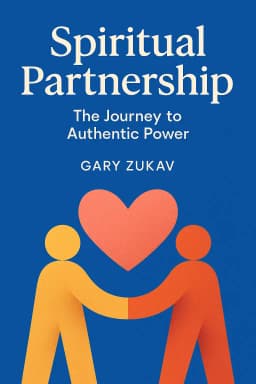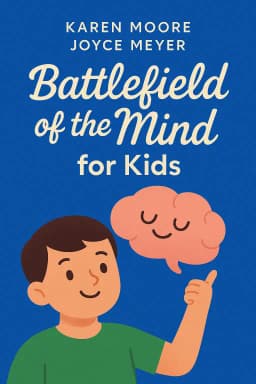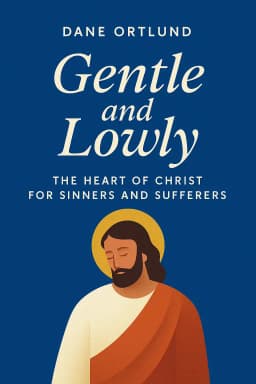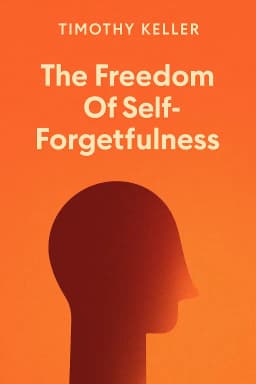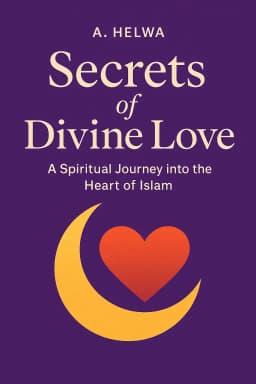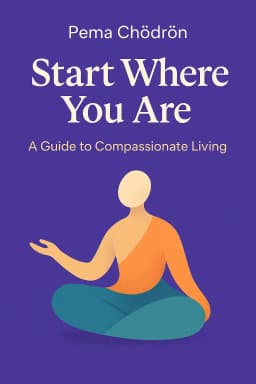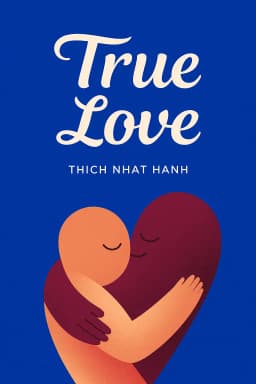
The Architecture of Love
Golden Hook & Introduction
SECTION
Daniel: Everything Hollywood ever taught you about love is probably wrong. That feeling of 'falling' for someone? According to one of the most revered spiritual teachers of our time, that might just be a distraction from your own suffering. The real thing is something you build, not something you find. Sophia: Wow, starting with a takedown of every rom-com ever made. I'm in. So you're telling me my grand, cinematic, running-through-the-airport moment is just me avoiding my own problems? Daniel: It might be! Or at least, it's not the whole picture. We're so conditioned to see love as this magical, external force that happens to us. But the book we're diving into today reframes it completely. It’s an active, daily practice. Sophia: Okay, I’m intrigued. What book is this that’s about to shatter all my romantic illusions? Daniel: It’s a small but mighty book called True Love: A Practice for Awakening the Heart by Thich Nhat Hanh. Sophia: Ah, Thich Nhat Hanh. I know the name. A giant in the world of mindfulness. Daniel: A true giant. And this comes from the Zen master who was famously nominated for the Nobel Peace Prize by Martin Luther King Jr. himself. So when he talks about peace and love, it's not just theory—it's rooted in a life of profound activism and deep contemplation. He lived through war and exile, so his ideas about love are forged in real-world suffering, not just quiet meditation. Sophia: That adds a lot of weight. It’s not just philosophical fluff. It’s wisdom earned the hard way. So, if love isn't this magical lightning strike, what is it? Where does he even begin? Daniel: He begins with a very simple, very powerful metaphor about the size of your heart.
The Architecture of True Love: Beyond Feeling to Practice
SECTION
Daniel: Hanh's first big idea is that to build love, you first need to expand your heart. He tells this incredible story to explain it. He says, imagine you take a handful of salt and pour it into a small cup of water. Sophia: Right, the water becomes undrinkable. Way too salty. Daniel: Exactly. It’s bitter, you can’t use it. That cup, he says, is like a small heart—a heart with limited understanding and compassion. When someone does something to hurt you—that’s the salt—it overwhelms you. The whole relationship becomes bitter and undrinkable. Sophia: I can definitely relate to that. That feeling when one small, annoying habit suddenly feels like the biggest problem in the world. Daniel: Precisely. But then he says, now take that same handful of salt and pour it into a massive, flowing river. Sophia: Huh. The salt just dissolves. The river is so vast, the saltiness becomes negligible. People can still drink the water, cook with it, wash with it. The river just keeps on flowing. Daniel: And that river is an expansive heart. It has so much capacity, so much understanding and compassion, that it can receive the same amount of salt—the same shortcomings, the same pain—and transform it. It doesn't get overwhelmed. It embraces the suffering and keeps providing life. Sophia: Okay, so the 'salt' is like when your partner leaves their wet towel on the bed for the millionth time. A small heart gets bitter and the whole day is ruined. A big heart... just absorbs it? Does that mean being a doormat? Daniel: That’s the perfect question. And no, it’s not about being a doormat. It’s about having the inner capacity to not let the small stuff poison the whole system. An expansive heart can look at the wet towel and understand the person behind it—maybe they were rushed, maybe they were stressed—instead of just reacting to the isolated, annoying act. The river doesn't ignore the salt; it's big enough to dilute it and transform it. Sophia: That’s a huge mental shift. It’s moving from judgment to understanding. But how do you build a heart the size of a river? That sounds like a lifelong construction project. Daniel: It is! And he gives us the blueprints. He says true love is built from four specific materials. In the Buddhist tradition, these are called the Four Immeasurables. They are maitri, which is loving-kindness; karuna, which is compassion; mudita, which is joy; and upeksha, which is equanimity or freedom. Sophia: This sounds beautiful, but also like a checklist for enlightenment, not a real relationship. Loving-kindness, compassion... what about just... liking someone? Or being attracted to them? It feels very lofty. Daniel: I get that. It can sound that way. But he breaks it down. Loving-kindness, or maitri, isn't some abstract virtue. It’s the simple ability to offer happiness. But here’s the key: you can't offer happiness to someone else if you don't have any to give. So the practice starts with yourself. It’s about being a source of joy, first for yourself, and then for others. Sophia: So it’s not about being perfect, but about being able to generate your own sense of well-being. Daniel: Exactly. And compassion, karuna, isn't just feeling sorry for someone. He makes a critical distinction. The word compassion literally means 'to suffer with.' But he says karuna is more than that. It’s the capacity to remove and transform suffering. Like a good doctor who doesn't just sit and feel bad with you, but understands the illness and gives you the medicine to heal. Sophia: I like that. It’s active, not passive. And what about the other two? Joy and freedom? Daniel: Joy, mudita, is the opposite of jealousy. It’s the ability to feel happiness at someone else’s happiness. If your partner gets a promotion, you don't feel a pang of 'what about me?'; you feel genuine, unselfish joy for them. And the last one, upeksha, is maybe the most radical. It’s often translated as equanimity, but he defines it as freedom or inclusiveness. Sophia: Freedom. That’s a word you don’t often hear in discussions about love and commitment. It’s usually about security and attachment. Daniel: Right? But for him, in a deep relationship with upeksha, the boundary between you and the other person dissolves. Their happiness is your happiness. Their suffering is your suffering. There's no 'your problem' versus 'my problem.' But because of that deep connection, there's also immense freedom. You don't need to control them or possess them, because you trust in that shared existence. Sophia: Wow. Okay, so it’s not a checklist. It's more like an ecosystem. Each element feeds the others. But it still feels like it requires a ton of conscious effort. It’s not something that just happens. Daniel: That’s the entire point. It’s a practice. And he gives very concrete, sometimes surprisingly simple, ways to practice it every single day.
The Daily Nourishment of Love: Mindfulness in Action
SECTION
Sophia: Okay, so if it's a practice, what are the actual exercises? I'm picturing relationship push-ups. Daniel: (Laughs) Funnily enough, one of them is a kind of push-up... a hugging push-up. He tells this wonderful, very human story about how he invented what he calls "hugging meditation." Sophia: Hugging meditation? Please tell me more. Daniel: It was 1966, and he was at the Atlanta airport saying goodbye to a friend. He mentions that in his culture at the time, people didn't really hug. But his American friend asked if she could hug a Buddhist monk. He was a bit taken aback but agreed. He said he felt completely stiff and awkward during the hug. Sophia: Oh, I know that feeling. The awkward, pat-on-the-back hug. Daniel: Exactly. And on the plane ride, he reflected on it. He realized that if he wanted to connect with people in the West, he needed to understand their way of expressing affection. But he wanted to do it mindfully. So he created hugging meditation. Sophia: I love that! But it also sounds like it could be incredibly awkward. Do you just announce 'Time for our hugging meditation'? Daniel: (Chuckles) You could, but it’s more about the inner practice. The idea is to be 100% present in the hug. You breathe in and out three times. And he offers a little mantra to say silently to yourself. With the first breath, "Breathing in, I know my dear one is in my arms, alive." With the second, "Breathing out, she is so precious to me." And with the third, you just enjoy the presence. It turns a routine gesture into a moment of profound connection. Sophia: That’s actually really beautiful. It’s about transforming a simple action into an act of presence. It’s not about the hug itself, but the awareness you bring to it. Daniel: Precisely. And that’s the theme for all his practices. Another one he calls "watering the flower." He tells a story about giving a talk at his practice center in France. A woman in the audience was crying the entire time. After the talk, he went to her husband and said, very gently, "Dear friend, your flower needs some water." Sophia: Wow. What a poetic way to say 'your wife is upset, go talk to her.' Daniel: Isn't it? The husband understood immediately. On the drive home, he turned to his wife and started 'watering' her—telling her all the things he appreciated about her, the qualities he saw in her that made her beautiful and strong. By the time they got home, she was transformed, beaming with joy. Their kids were shocked to see them so happy. Sophia: So it's about actively looking for the good things and 'watering' them with your attention and words, instead of just focusing on the weeds. We all have flowers and we all have garbage inside us, and what grows is what you feed. Daniel: That's the perfect way to put it. It’s a practice of selective watering. And it’s not about ignoring the garbage, or the suffering. In fact, he has very specific practices for that too. But it’s about making a conscious choice to nourish the positive. And this daily nourishment, this active practice, is what builds the foundation for the most profound and paradoxical part of his teaching. Sophia: Which is? Daniel: That real love isn't about holding on tighter, but about giving freedom.
The Paradox of True Love: Freedom, Not Attachment
SECTION
Daniel: Exactly. And that watering leads to the most radical idea in the whole book: that real love isn't about holding on tighter, but about giving freedom. This is where he really diverges from the typical Western model of romance. Sophia: Okay, this is where I might get skeptical. 'Freedom' and 'non-attachment' can sound cold. It sounds like you're saying we shouldn't care deeply about our partners. Daniel: It’s the opposite, actually. He argues that the clinging, possessive kind of love is born from our own fear and emptiness. We’re like a drowning person grabbing onto a log. True love, he says, comes from a place of inner fullness. It’s like the sun—it shines on everyone without needing anything back. Sophia: So how do you get there? How do you stop being the drowning person and become the sun? Daniel: It starts with two things that are often overlooked in love: respect and trust. And crucially, self-respect and self-trust. He has this heartbreaking little story about a woman who, her whole life, could never say 'no' to men. If a man asked her for anything, she felt compelled to agree, even if it caused her immense suffering. Sophia: Oh, I think many people can relate to that on some level. The disease to please. Daniel: Totally. And Thich Nhat Hanh’s point is that her inability to say 'no' wasn't a sign of love, but a lack of it—a lack of love for herself. He says, "Loving someone doesn’t mean saying 'yes' to whatever the other person wants." To truly love, you have to be able to listen to your own needs first. Sophia: This is fascinating. He was talking about boundaries and self-respect decades before they became buzzwords on social media. It reframes saying 'no' not as an act of rejection, but as an act of preserving the relationship—and yourself. You can't pour from an empty cup, or an undrinkable salty one, to use his other metaphor. Daniel: You absolutely can't. And this is where trust comes in. He says flatly, "Love without trust is not yet love." If you don't trust your partner, and if you don't trust yourself, you can't have that sense of freedom. You'll always be checking, worrying, clinging. Sophia: So the freedom, the upeksha, isn't about emotional distance. It's the end result of having a foundation of total trust and mutual respect. Daniel: Exactly. It’s the freedom from fear. The freedom from the need to control or possess. He says one of the greatest gifts you can offer someone is to embody non-attachment and non-fear. When you are at peace with yourself, you don't need your partner to be your source of validation or to complete you. You can just love them for who they are, and give them the space to be who they are. Sophia: That feels like the ultimate goal. It’s a love that’s not based on neediness, but on generosity. It’s not about finding your 'other half,' because you're already whole. Daniel: You are already whole. And you recognize that they are whole, too. He uses the analogy of two trees. A relationship isn't two half-trees leaning on each other to stay up. If one moves, the other falls. It's two whole trees, standing strong on their own, with their roots intertwined underground for support, but their branches free to grow towards the sun in their own way. Sophia: That’s a beautiful image. It completely changes the goal of a relationship. It’s not about merging into one, but about supporting each other’s individual flourishing. Daniel: And that, for him, is the essence of true love. It’s a practice that ultimately liberates both people.
Synthesis & Takeaways
SECTION
Daniel: When you put it all together, it’s such a clear and powerful pathway. We start by building a bigger heart, one that can hold pain without becoming bitter—the river, not the cup. Sophia: Then we actively nourish that love every day with mindful practices—like really being present in a hug, or 'watering the flowers' of our partner by focusing on their strengths. Daniel: And all of that consistent, mindful practice leads to a love that is so strong and so rooted in self-respect that it doesn't need to cling. It's a love that creates freedom, not a cage. It sets you, and the person you love, free. Sophia: It’s a profound departure from our cultural script. The script says love is a feeling that should be effortless. He says it’s a skill that requires practice. The script says love is about finding 'the one' to complete you. He says it’s about becoming complete in yourself so you can offer love freely. Daniel: And the book is filled with these little tools, like the 20 questions for reflection at the end, or the Six Mantras for communication. They're all designed to make this grand philosophy a concrete, daily reality. It's incredibly practical. Sophia: It really challenges you to ask a fundamental question about your own relationships: Is my love making me and the people I love more free, or less? It's a powerful question to sit with. Daniel: It really is. And it doesn't have to be some huge, dramatic overhaul. It can start small. We'd love to hear what you all think. What's one small way you could 'water a flower' for someone in your life this week? A word of appreciation, a fully present moment. Let us know your thoughts and experiences. Sophia: This is Aibrary, signing off.
